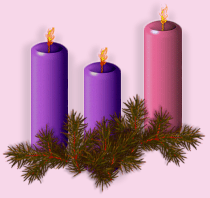

Third Sunday of Advent
[Guadete Sunday]: December 15
EXTRACT FROM The Liturgical Year, Dom Guéranger, O.S.B.
VIEW THE VIRGIN ANNUNCIATE BY CARLO DOLCI, PLAIN
TODAY, again, the Church is full of joy, and the joy is greater than it was. It is true that her Lord has not come; but she feels that He is nearer than before, and therefore she thinks it just to lessen somewhat the austerity of this penitential season by the innocent cheerfulness of her sacred rites. And first, this Sunday has had the name of Gaudete given to it, from the first word of the Introit; it also is honored with those impressive exceptions which belong to the fourth Sunday of Lent, called Lætare. The organ is played at the Mass; the vestments are rose-color [optional]; the deacon resumes the dalmatic, and the subdeacon the tunic; and in cathedral churches the bishop assists with the precious miter. How touching are all these usages, and how admirable this condescension of the Church, wherewith she so beautifully blends together the unalterable strictness of the dogmas of faith and the graceful poetry of the formulæ of her liturgy! Let us enter into her spirit, and be glad on this third Sunday of her Advent, because our Lord is now so near unto us. Tomorrow we will resume our attitude of. servants mourning for the absence of their Lord and waiting for Him; for every delay, however short, is painful and makes love sad.
The Station is kept in the basilica of St. Peter, at the Vatican. This august temple, which contains the tomb of the prince of the Apostles, is the home and refuge of all the faithful of the world; it is but natural that it should be chosen to witness both the joy and the sadness of the Church.
The night Office commences with a new Invitatory. The voice of the Church no longer invites the faithful to come and adore in fear and trembling the King, our Lord, Who is to come. Her language assumes another character; her tone is one of gladness; and now, every day, until the vigil of Christmas, she begins her nocturnes with these grand words:
The Lord is now nigh; come, let us adore .
. . O holy Roman Church, city of our strength! Behold us thy children
assembled
within thy walls, around the tomb of the fisherman, the prince of the
Apostles,
whose sacred relics protect thee from their earthly shrine, and whose
unchanging
teaching enlightens thee from Heaven. Yet, O city of strength: it is by
the Savior, Who is coming, that thou art strong. He is thy wall, for it
is He that encircles, with His tender mercy, all thy children; He is
thy
bulwark, for it is by Him that thou art invincible, and that all the
powers
of Hell are powerless to prevail against thee. Open wide thy gates,
that
all nations may enter thee; for thou art mistress of holiness and the
guardian
of truth. May the old error, which sets itself against the faith, soon
disappear, and peace reign over the whole fold! O holy Roman Church!
thou
hast forever put thy trust in the Lord; and He, faithful to His
promise,
has humbled before thee the haughty ones that defied thee, and the
proud
cities that were against thee. Where now are the Cæsars, who
boasted
that they had drowned thee in thine own blood? Where the emperors, who
would ravish the inviolate virginity of thy faith? Where the heretics,
who, during the past centuries of thine existence, have assailed every
article of thy teaching, and denied what they listed? Where the
ungrateful
princes, who would fain make a slave of thee, who hadst made them what
they were? Where that empire of Mahomet, which has so many times raged
against thee, for that thou, the defenseless State, didst arrest the
pride
of its conquests? Where the reformers, who were bent on giving the
world
a Christianity, in which thou wast to have no part? Where the more
modern
sophists, in whose philosophy thou wast set down as a system that had
been
tried, and was a failure, and is now a ruin; and those kings who are
acting
the tyrant over thee, and those people that win have liberty
independently
and at the risk of truth, where win they be in another hundred years?
Gone
and forgotten as the noisy anger of a torrent; whilst thou, O holy
Church
of Rome, built on the immovable rock, wilt be as calm, as young, as
unwrinkled
as ever. Thy path through all the ages of this world's duration, will
be
right as that of the just man; thou wilt ever be the same unchanging
Church,
as thou hast been during the eighteen hundred years past, whilst
everything
else under the sun has been but change. Whence this thy stability, but
from Him Who is very truth and justice? Glory be to Him in thee! Each
year,
He visits thee; each year, He brings thee new gifts, where with thou
mayst
go happily through thy pilgrimage; and to the end of time, He will
visit
thee, and renew thee, not only with the power of that look wherewith
Peter
was renewed, but by filling thee with Himself, as He did the ever
glorious
Virgin, who is the object of thy most tender love, after that which
thou
bearest to Jesus Himself. We pray with thee, O Church, our mother, and
here is our prayer: 'Come, Lord Jesus! Thy name and Thy remembrance are
the desire of our souls: they have desired Thee in the night, yea, and
early in the morning have they watched for Thee.'


HOME-----------------------------------------------OUR LADY
www.catholictradition.org/Advent/advent6.htm